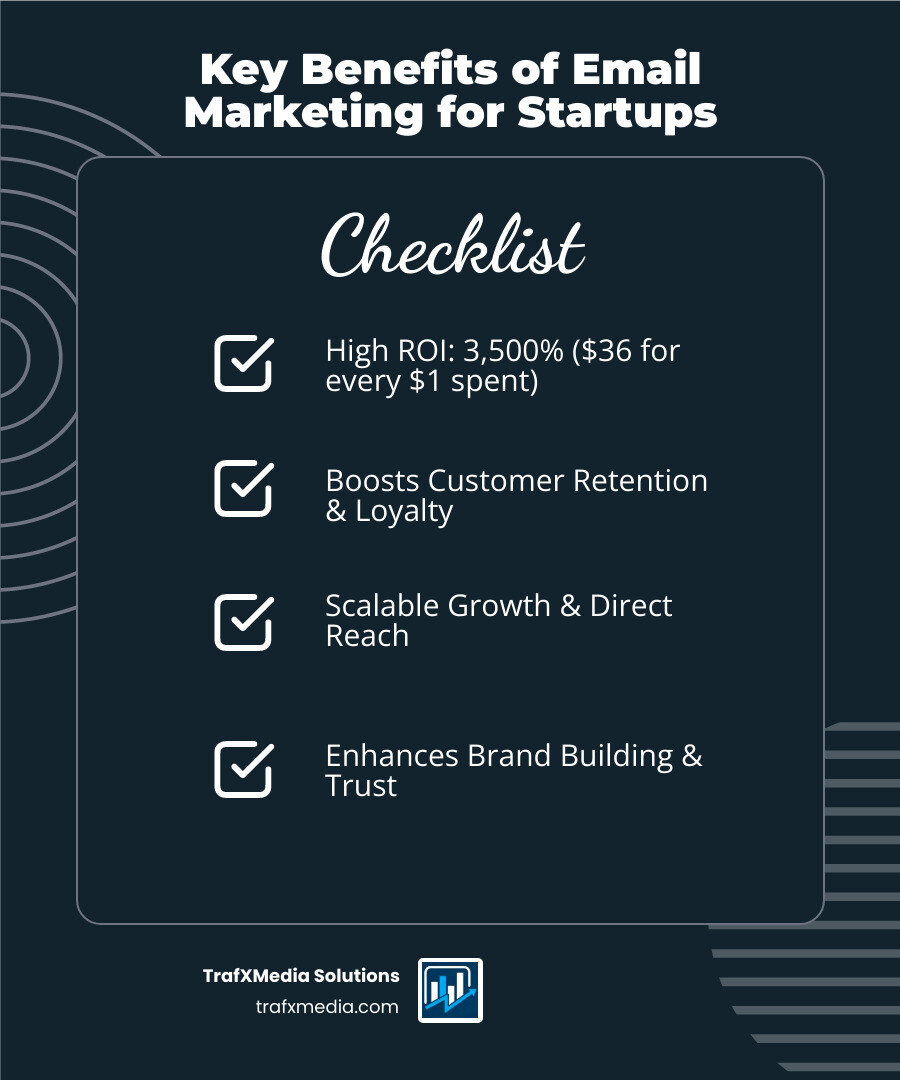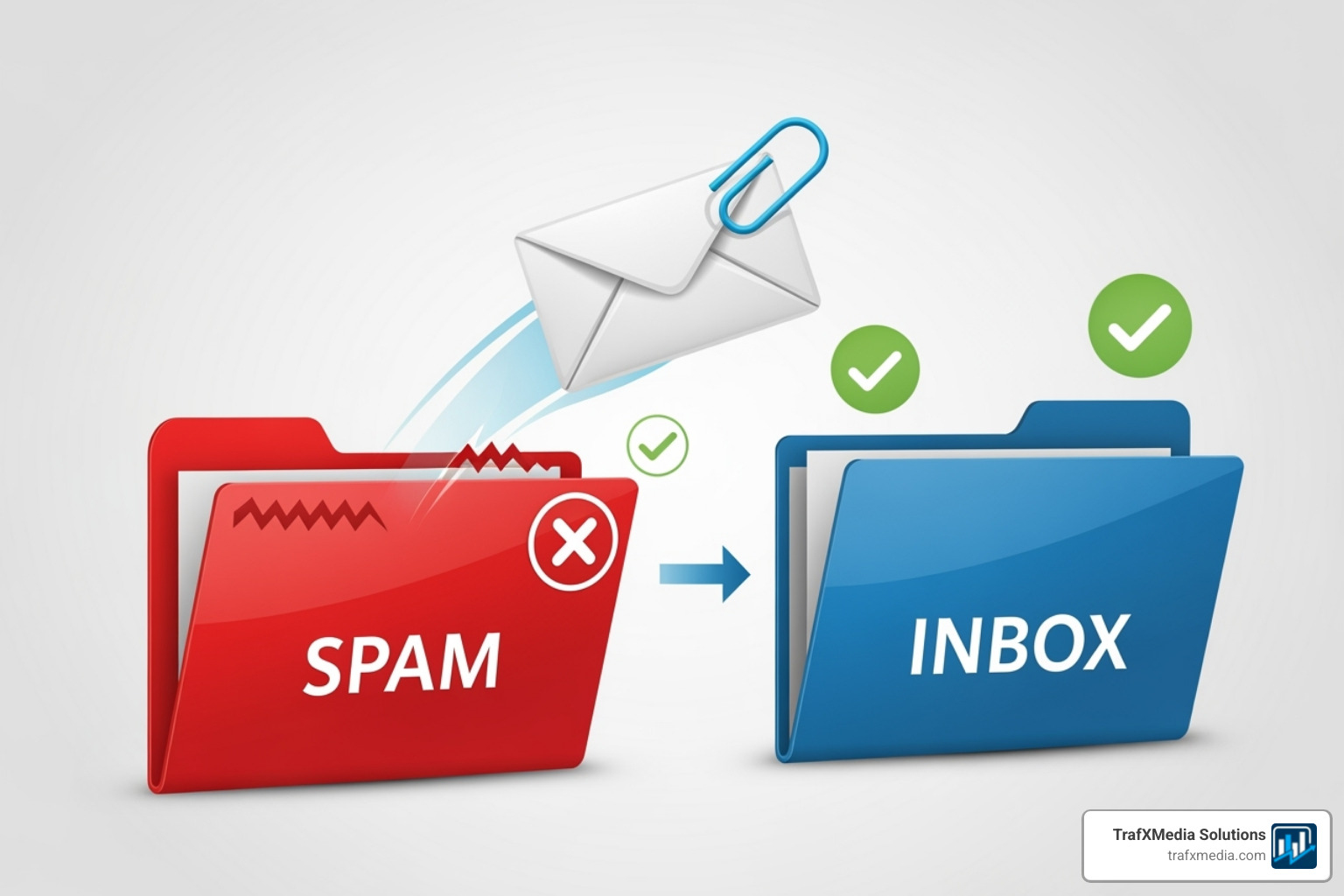Fueling Growth: The Ultimate Guide to Email Marketing Tools for Startups
Why Startups Need Email Marketing Services More Than Ever
Startup email marketing services are essential platforms that help new businesses build direct relationships with customers, generate leads, and drive revenue through targeted email campaigns. Here are the top platforms startups should consider:
Best Email Marketing Services for Startups:
- Mailchimp – Comprehensive automation with AI-powered features
- MailerLite – User-friendly with generous free plan (1,000 subscribers)
- Brevo – Multi-channel approach including SMS and WhatsApp
- ActiveCampaign – Advanced automation and personalization
- Kit – Designed specifically for creators and content businesses
- GetResponse – All-in-one marketing with webinar integration
Starting a business is tough. You’re juggling product development, customer acquisition, and countless other priorities. But here’s the reality: email marketing delivers an astounding 3,500% ROI – that’s $36 for every dollar spent.
The numbers don’t lie. Email remains one of the most effective ways to reach your audience directly. Unlike social media algorithms that limit your reach, email lands straight in your customer’s inbox. It’s personal, measurable, and scalable.
But choosing the right email marketing service can feel overwhelming. With dozens of options available, each promising different features and benefits, how do you know which one will actually help your startup grow?
The challenge isn’t just finding a platform – it’s finding one that understands the unique needs of startups. You need something that’s affordable today but can scale as you grow. You need powerful automation without the complexity. Most importantly, you need a service that helps you build genuine relationships with your customers, not just blast them with sales pitches.
This guide cuts through the noise to help you make the right choice for your business.
I’m Richard Taylor, an SEO strategist and business consultant who has helped numerous Silicon Valley startups implement effective startup email marketing services to accelerate their growth. My experience working with both established brands and emerging companies has given me deep insight into what actually works in today’s competitive digital landscape.

Key startup email marketing services vocabulary:
Core Features: What Every Startup Email Marketing Service Must Have
This section details the non-negotiable features that form the foundation of a powerful email marketing platform, ensuring you can create, send, and track campaigns effectively from day one. When we advise startups, we always emphasize that a strong foundation is key. Without these essential tools, even the most brilliant marketing strategy can fall flat.
Intuitive Campaign Creation
Imagine trying to build a house without a blueprint or proper tools. That’s what creating email campaigns without an intuitive platform feels like! For a startup email marketing service, a user-friendly interface is paramount. Look for platforms that offer drag-and-drop editors, which simplify the design process, allowing you to create beautiful, professional-looking emails without needing to know a single line of code. It’s like having a digital artist at your fingertips. This accessibility empowers your entire team, not just developers, to contribute to marketing efforts, dramatically speeding up campaign deployment.
It’s also crucial that your emails look fantastic on any device. Mobile-responsive templates are no longer a luxury; they’re a necessity. With over half of all emails being opened on mobile devices, a message that isn’t optimized for a smaller screen is likely to be quickly deleted. A good platform will offer extensive template libraries that are pre-vetted for responsiveness. These libraries should provide a range of options, from promotional layouts to newsletters and transactional confirmations. Furthermore, look for services that allow you to create a “brand kit,” where you can pre-load your company’s logos, color palettes, and fonts. This helps maintain brand consistency across all your communications with minimal effort, ensuring your startup always looks polished and professional.
Finally, to truly understand what resonates with your audience, A/B testing capabilities are vital. This allows you to test different elements of your campaign on a small portion of your audience before sending the winning version to the rest. You can test subject lines to improve open rates, but don’t stop there. Test different calls-to-action (e.g., “Shop Now” vs. “Learn More”), button colors, sender names (e.g., “Richard from TrafXMedia” vs. “TrafXMedia Team”), email copy length, and even send times. It’s like having a built-in market research team, constantly refining your approach for maximum impact and helping your messages hit home every time.

Powerful Audience Management and Growth
Your email list is your most valuable asset. It’s a direct line to your customers, prospects, and advocates – a golden opportunity to build lasting relationships. A top-tier startup email marketing service doesn’t just send emails; it helps you build and manage this asset effectively, turning casual visitors into loyal fans.
Think about how you capture leads. Does your chosen service offer customizable lead capture forms that you can embed on your website or social media? What about landing page builders? These dedicated pages are designed to convert visitors into subscribers, offering a seamless experience from click to signup. Getting people onto your list should be as easy as pie!
Once you have subscribers, you need to understand them. This is where contact segmentation comes in. Instead of treating all your subscribers the same, segmentation allows you to group them based on specific criteria. This can include: demographic data (age, location, gender), behavioral data (purchase history, email open/click patterns, website pages visited), or psychographic data (interests, values). This means you can send highly relevant, personalized messages that resonate deeply. For instance, a startup we worked with had over 20,000 email subscribers tracked in a Google Sheet. Moving them to a proper email service provider (ESP) allowed for data capture and segmentation, changing their once unwieldy list into a targeted powerhouse. Personalization tags, which automatically insert a subscriber’s name or other details, further improve this custom experience. To maintain a healthy and engaged audience, it’s also critical to practice good list hygiene. This involves regularly removing inactive or invalid email addresses. A good platform will help you identify these subscribers so you can either attempt a re-engagement campaign or remove them, which improves your deliverability and can lower your subscription costs.
Smart Automation Capabilities
In startups, time is money. Marketing automation is like having a tireless, highly efficient employee who works around the clock, ensuring your messages are sent at precisely the right moment. For startup email marketing services, automation isn’t just a feature; it’s a game-changer that frees up your valuable time.
Imagine automatically sending a warm welcome email series to every new subscriber, introducing them to your brand and values without you lifting a finger. Or consider a post-purchase workflow: the first email confirms the order, a second email sent a week later asks for a product review, and a third email a month later suggests complementary products. Behavioral triggers are even smarter: if a customer views a product but doesn’t buy, an abandoned cart reminder can be sent automatically. You can also set up a re-engagement campaign that automatically targets subscribers who haven’t opened an email in 90 days with a special offer to win them back. It’s about being there for your customers exactly when they need you, without constant manual effort.
Some platforms even excel in “autonomous marketing,” where intelligent systems work for you, taking automation beyond simple triggers. The goal is to move from manual, reactive emailing to proactive, intelligent communication that keeps your business moving forward, even while you sleep.
Learn how to create transactional emails
Actionable Analytics and Reporting
Sending emails is only half the battle; knowing if they’re working is the other, equally important half. A robust startup email marketing service provides comprehensive analytics and reporting tools that turn raw data into actionable insights. It’s like having a detailed map that shows you exactly where you’re going and what’s working along the way.
You’ll want to track key metrics like open and click-through rates to understand engagement. But don’t stop there! Dig deeper into metrics like:
- Conversion Rate: The percentage of recipients who completed a desired action (e.g., made a purchase). This is the ultimate measure of your campaign’s success.
- Bounce Rate: The percentage of emails that couldn’t be delivered. A high bounce rate can damage your sender reputation, so it’s crucial to monitor and clean your list.
- Unsubscribe Rate: The percentage of users who opt out. A high rate might indicate your content isn’t relevant or you’re sending too frequently.
- List Growth Rate: How quickly your list is expanding. This is a key indicator of the health of your marketing funnel.
Real-time performance dashboards give you an immediate snapshot of how your campaigns are doing, allowing for quick adjustments. The ability to compare campaigns side-by-side helps you identify trends and learn what works best over time. These insights are gold for a startup looking to optimize its marketing spend and strategy. We find that the more granular the analytics, the better you can refine your approach, ensuring every email you send is smarter than the last.
Watch a demo of interactive dashboards
Scaling for Success: Choosing a Platform That Grows With You
As a startup, you’re always looking ahead, right? Your business is a living, breathing thing that’s constantly growing and evolving. That’s why choosing an email marketing service isn’t just about what you need right now. It’s about finding a true partner that can grow with you, from your very first subscriber all the way to your millionth. What works for a small list today might not be enough when your audience expands tomorrow. You need a platform that can keep up with your exciting journey!
Understanding Plan Structures and Scalability
Many startup email marketing services roll out the welcome mat with free plans or trials. These are fantastic for getting started without a big upfront cost! However, it’s super important to peek under the hood and understand what these free plans actually offer. They usually come with some limits, like how many subscribers you can have or how many emails you can send each month. Think of them as training wheels – great for learning, but you’ll eventually want to ride without them.
These free plans often have certain features “gated,” meaning advanced tools like detailed analytics, deep automation, or priority support are saved for their paid tiers. Some might even add their own branding to your emails, which isn’t ideal for your professional image as you grow.
So, when should a startup consider upgrading? It’s usually when you hit those subscriber or sending limits, or when you find yourself needing more sophisticated features. Maybe you want more advanced segmentation, better A/B testing options beyond just subject lines, or deeper automation capabilities. We once worked with a startup that had over 20,000 subscribers and expected to double that soon. For them, scalability was a huge concern! Evaluating different subscription models means understanding how costs increase as your contact list grows. Look for flexible options, like pay-as-you-go, which can be a lifesaver if your email volume changes from month to month.
The Power of Integrations in Startup Email Marketing Services
Your business doesn’t live in a bubble, and neither should your marketing tools! The real magic of a startup email marketing service shines when it plays nicely with all the other platforms you use every day. Imagine your different tools chatting with each other, sharing information effortlessly. That’s what seamless integration gives you – a marketing ecosystem that works together like a well-oiled machine.
Consider your customer relationship management (CRM) system. When your email marketing talks to your CRM, all your customer data is in one place. This gives you a complete picture of each customer’s journey, leading to better personalization and smarter messages. For online stores, e-commerce platform synchronization is a game-changer. Imagine automatically sending “oops, you left something behind!” reminders for abandoned carts, or personalized product recommendations based on past purchases. It’s all based on real-time sales data!
Some platforms also offer API (Application Programming Interface) access. This is like a secret handshake that allows for custom solutions and deeper connections with any unique tools your startup might be developing. This interconnectedness doesn’t just save you time; it provides richer data that helps you make even smarter marketing decisions.
Beyond Email: Exploring Omnichannel Marketing
Email is a superstar, no doubt. It’s a core part of any successful digital marketing strategy. But what if you could reach your audience in even more ways? The best startup email marketing services understand this, offering what’s called “omnichannel” capabilities. This simply means they help you connect with your customers wherever they are, not just in their inbox.
Take SMS marketing campaigns, for example. They offer an immediate and direct way to share time-sensitive offers, important updates, or quick alerts. With super high open rates, SMS can be incredibly impactful for flash sales or urgent messages. Some platforms, like Mailchimp and Brevo, have already built SMS right into their services.
Beyond SMS, some services are even expanding into WhatsApp messaging and website chat integration. This creates a truly unified communication experience. You can manage customer interactions across many different touchpoints, all from one central platform. This means consistent messaging for your brand and a complete view of your customer. This multi-channel approach is absolutely vital for engaging today’s connected consumer and building a truly comprehensive marketing strategy that gets noticed.
Protecting Your Brand: Deliverability and Support in Startup Email Marketing Services
Sending an email is easy; getting it into the inbox is the real challenge. Think of it like sending a letter: you want it to reach the recipient’s mailbox, not end up in the recycling bin! This section covers the critical technical aspects and support systems that protect your reputation and ensure your messages are seen. After all, what good is a perfectly crafted email if it lands in the spam folder?

Why Sender Reputation is Critical for Startup Email Marketing Services
Your sender reputation is like your business’s credit score in the email world. It tells internet service providers (ISPs) like Gmail and Outlook how trustworthy you are as a sender. A stellar reputation means your emails are far more likely to land right in the inbox. A poor reputation is a one-way ticket to the dreaded spam folder. This is why email deliverability explained is so crucial for any startup email marketing service. It’s about ensuring your message actually gets to its destination.
A truly reputable email marketing service understands this. They employ robust authentication protocols such as SPF (Sender Policy Framework), which specifies which mail servers are allowed to send email for your domain, and DKIM (DomainKeys Identified Mail), which adds a digital signature to your emails. Building on these is DMARC (Domain-based Message Authentication, Reporting, and Conformance), a policy that tells receiving servers what to do with emails that fail SPF or DKIM checks (e.g., quarantine them or reject them). Proper setup of all three is essential to prove your emails are genuinely from you.
The service should also be proactive in helping you with bounce and complaint management. Bounces happen when emails can’t be delivered, and complaints occur when recipients mark your emails as spam. A good platform automatically removes these problematic addresses from your list, keeping it clean and healthy. Finally, understanding your IP reputation is key. Most startups begin on a shared IP address, which is cost-effective but means your deliverability can be affected by other senders. As you grow, you might consider a dedicated IP, which gives you full control over your reputation but requires a careful “warm-up” process of gradually increasing send volume to build trust with ISPs. A good service will guide you through this process to protect your sending integrity.
Evaluating Support and Onboarding Resources
Even the most intuitive software can lead to questions, especially for a busy startup team learning the ropes. The quality of support and onboarding provided by a startup email marketing service can truly make or break your experience. Think of it as having a helpful co-pilot guiding you through new territory.
When choosing a service, look for several key support features. Can you easily find answers through comprehensive knowledge bases and documentation? These should include not just articles but video tutorials and clear API documentation for your developers. When you have a pressing issue, how quickly can you get a helpful response via responsive live chat and email support? For more complex problems, phone support options can be a huge bonus. Don’t underestimate the value of a vibrant user community forum, where you can learn from peers and find creative solutions to common challenges.
For new users, a dedicated onboarding specialist can significantly smooth the learning curve. This person should be more than a tour guide; they should be a strategist who helps you migrate your list, set up authentication protocols correctly, and design your first campaigns for success. The best services don’t just fix problems; they proactively offer advice to improve your strategy. For lean startup teams, having this kind of quick, reliable, and strategic assistance is a game-changer.
The Future is Now: Leveraging AI in Your Email Strategy
Remember when AI felt like something out of a sci-fi movie? Well, for startup email marketing services, it’s very much real and ready to work for you! Think of it as having an incredibly smart, super-efficient assistant for your email campaigns. This isn’t about robots taking over; it’s about making your marketing smarter, faster, and much more effective, giving your startup a real edge.
AI-Powered Content and Design
Ever found yourself staring at a blank screen, trying to come up with the perfect email subject line or engaging copy? We’ve all been there! The good news is, many top-tier startup email marketing services are now bringing in AI to help you. It’s like having a brilliant co-writer at your fingertips.
Imagine AI subject line generators that can whip up catchy headlines designed to get your emails opened. Or automated email copy creation tools that draft engaging content custom to your products and audience, saving you precious hours. This isn’t just a gimmick; it’s a proven way to make your emails work harder. Businesses have already sent billions of emails using AI-generated content, showing just how widely useful this feature has become.
Even better, some platforms offer predictive content recommendations. This means the AI looks at what your audience likes and suggests the best content or offers for them. It’s about sending exactly what your customers want to see, making your emails incredibly effective.
Intelligent Optimization and Analytics
But AI’s magic doesn’t stop at just creating content. It’s also changing how we fine-tune and understand our email campaigns. This is where AI truly helps you get the most bang for your buck.
Think about AI-driven send time optimization. No more guessing when your subscribers are most likely to open your emails! The AI analyzes past behavior and tells you the absolute best moment to hit ‘send’ for maximum engagement. This alone can make a huge difference in your open and click rates.
Then there’s predictive audience segmentation. AI can spot hidden patterns in your data, allowing you to segment your audience with incredible precision. This means you can send the right message to the right person at the right time, every single time. It’s about being incredibly relevant.
And to top it all off, automated performance insights turn confusing data into clear, actionable advice. The AI can highlight important trends, show you where to improve, and even suggest your next smart move. Instead of just seeing numbers, you get a clear roadmap for growth. This helps your startup make really confident, data-backed decisions, paving the way for success.
Frequently Asked Questions
When you’re diving into email marketing, especially as a startup, it’s natural to have a few burning questions. Think of us as your friendly guides, here to shed some light on the most common queries.
How do I build my initial email list as a startup?
Building an email list from scratch might feel like trying to fill a swimming pool with a teacup, but trust us, it’s totally doable and incredibly rewarding! Your email list is your direct line to future customers, so let’s get it growing.
One of the best ways to attract subscribers is to offer something valuable in return. We call these “lead magnets.” This could be a handy e-book, a free template, a checklist that makes life easier, or even a mini-course. Give away something awesome, and people will happily share their email addresses.
Next, make sure it’s super easy for people to sign up on your website. Use clear calls-to-action (like a big, friendly “Subscribe Here!” button) and place your signup forms where they can be easily seen, without being annoying.
Want to see your list grow fast? Run exciting contests or giveaways! If the prize is something your ideal customer would love, you’ll attract high-quality leads who are genuinely interested in what you do. And don’t forget the real world! If you attend events or network, have a simple way to collect emails at in-person events, like a tablet for quick sign-ups. Lastly, make sure to leverage social media by promoting your lead magnets and signup forms across your channels. It’s all about attracting folks who are genuinely excited about what you’re offering!
How often should a startup send marketing emails?
Ah, the age-old question: “How much is too much?” It’s a bit like asking how often you should call a new friend – you want to stay in touch, but you don’t want to overdo it! For startup email marketing services, the golden rule is always quality over quantity.
For many startups, especially when you’re just starting out, sending emails once or twice a month is a great rhythm. This gives you enough time to create truly valuable content without overwhelming your audience. The real trick is to provide value in every single email. Whether it’s a helpful tip, an exclusive insight, or a special offer, make sure your subscribers feel like it was worth opening.
We always encourage startups to test what works best for their unique audience. Keep an eye on your open rates, click-through rates, and especially your unsubscribe rates. If you notice a sudden jump in unsubscribes, it might be a hint that you’re sending too often, or perhaps your content isn’t hitting the mark. The goal is to avoid what we call “subscriber fatigue.” You want your audience to look forward to your emails, not dread them!
What’s the difference between marketing and transactional emails?
Understanding the difference between these two types of emails is super important, not just for good manners, but also for staying on the right side of the rules! Think of it like this: one is a friendly chat with a group, and the other is a personal message just for one person.
Marketing emails are all about promotion. These are the emails you send to your list of subscribers to share news, offers, or content. We’re talking newsletters, sales announcements, new product launches, or updates about your latest blog post. They’re typically sent to many people at once, like a broadcast.
Transactional emails, on the other hand, are triggered by a specific action a user takes. They’re non-promotional and are sent one-on-one to deliver important information related to that action. Think of your order confirmations after a purchase, shipping notifications, password reset links, or that welcome email you get after creating an account. Their main job is to confirm something or give necessary details.
It’s crucial to know the difference because different rules apply to each (like the CAN-SPAM Act in the U.S., which treats promotional emails differently from transactional ones). Most startup email marketing services can handle both, but set them up correctly to ensure your important messages always land where they’re supposed to.
Your Next Step to Email Marketing Success
Choosing the right startup email marketing service is a strategic decision that fuels growth, builds customer loyalty, and maximizes your marketing ROI. As we’ve explored, it’s not just about sending emails; it’s about having the right tools for intuitive campaign creation, powerful audience management, smart automation, and actionable analytics. Protecting your brand through strong deliverability and reliable support is non-negotiable, and leveraging AI will give your startup a competitive edge.
Focus on platforms with robust core features, proven deliverability, strong support, and the ability to scale alongside your business. For startups in the Bay Area, navigating the digital landscape requires a custom approach. TrafXMedia Solutions specializes in creating personalized marketing strategies that get results, helping local businesses thrive in a competitive market. We are here to help you turn your email marketing efforts into tangible growth.
Let us help you build a stronger online presence








